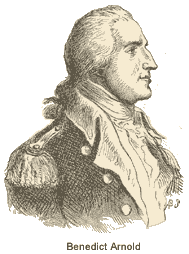Benedict Arnold was one of the most accomplished American military commanders in the War for Independence, but his contributions are often forgotten because of his later traitorous acts.
Arnold was born into a prominent family in Norwich, Connecticut, and as a young man was attracted to military life. He enlisted in the militia and saw his first action in the French and Indian War. He later worked as a druggist, then became prosperous through a number of trading ventures.
 At the outbreak of war against Britain, Arnold became a colonel in the militia and served with Ethan Allen in the capture of Fort Ticonderoga. (British supplies and equipment from that victory were transported back to George Washington on Dorchester Heights.)
Arnold led his soldiers in a perilous journey through Maine into Canada, and was wounded in the unsuccessful attack on Quebec on December 31, 1775. In the following year, Arnold`s forces were defeated in a battle on Lake Champlain, but he gained further respect for his skillful retreat that slowed the British advance toward New York City.
Though slighted by the Continental Congress, Arnold continued to serve with distinction, particularly against Burgoyne`s campaign in 1777.
His downward spiral began in earnest in 1778 when he was court-martialed on trivial charges and received a reprimand from Washington. In 1780, Arnold attempted to betray West Point to the British for a commission in their army and a sum of money, but the plot fell apart with the capture of Major John Andre. Arnold later led British forces against targets in Connecticut and Virginia, then lived out the remainder of his life in England as a rather poor and pathetic figure, scorned even by his new countrymen.
Why did Arnold feel compelled to commit treason? Several factors contributed, including the trivial court-martial matter, the failure to win expected promotions, and a pressing need for money caused largely by debts incurred after marrying a beautiful younger woman.
At the outbreak of war against Britain, Arnold became a colonel in the militia and served with Ethan Allen in the capture of Fort Ticonderoga. (British supplies and equipment from that victory were transported back to George Washington on Dorchester Heights.)
Arnold led his soldiers in a perilous journey through Maine into Canada, and was wounded in the unsuccessful attack on Quebec on December 31, 1775. In the following year, Arnold`s forces were defeated in a battle on Lake Champlain, but he gained further respect for his skillful retreat that slowed the British advance toward New York City.
Though slighted by the Continental Congress, Arnold continued to serve with distinction, particularly against Burgoyne`s campaign in 1777.
His downward spiral began in earnest in 1778 when he was court-martialed on trivial charges and received a reprimand from Washington. In 1780, Arnold attempted to betray West Point to the British for a commission in their army and a sum of money, but the plot fell apart with the capture of Major John Andre. Arnold later led British forces against targets in Connecticut and Virginia, then lived out the remainder of his life in England as a rather poor and pathetic figure, scorned even by his new countrymen.
Why did Arnold feel compelled to commit treason? Several factors contributed, including the trivial court-martial matter, the failure to win expected promotions, and a pressing need for money caused largely by debts incurred after marrying a beautiful younger woman.